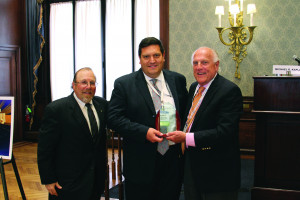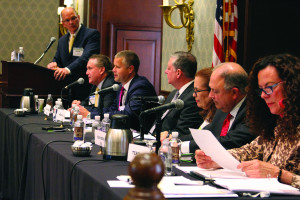Cloudless skies and balmy breezes welcomed the 11th Annual Philadelphia Credit and Restructuring Summit, making up for the massive March blizzard which caused the conference to be postponed. No boots or overcoats were in sight as the 146 attendees arrived at the Union League for the event sponsored by ABF Journal, New York Institute of Credit and the Philadelphia Chapters of the Commercial Finance Association and Turnaround Management Association.
As usual, the conference opened with a competitive game of Judicial Jeopardy hosted by the Honorable Michael B. Kaplan — the Alex Trebek of the Bankruptcy Court. This year, viewers were surprised to find themselves in Double Jeopardy — after the regular match with three bankruptcy judges battling for the trophy, a second match followed, featuring attorneys and turnaround professionals.

Both rounds tested the competitors’ knowledge of Philadelphia with categories related to the city’s sports, food, film and television presence, celebrities and history. In the opening round, veteran players the Honorable Vincent F. Papalia and the Honorable Jerrold N. Poslusny took on newcomer, the Honorable Magdeline D. Coleman. After a slow start, Judge Coleman grew more adept at managing her clicker, and she eventually emerged victorious.
In the second round, Aaron Applebaum of Saul Ewing competed against Steve Mitnick of SM Law and Paul Valentine of KCP Advisory Group. Going into Final Jeopardy, Applebaum had a slight lead of 4,000 over Mitnick’s 3,901. None of the contestants guessed the final Jeopardy answer, but Valentine’s low bid left him the winner.
Following the competition, Harvey Gross, executive director of NYIC, welcomed attendees, noting NYIC had just celebrated its centennial. He added the summit was, “our first program for the next 100 years.”
Titans of Lending
The opening session, Titans of Lending: Vision, Success and Growth — Where are the Opportunities in 2018, was moderated by Claudia Springer, a partner at Reed Smith. Panelists were John Brignola, founder of LBC Credit Partners; Andy McGhee, president/CEO of AloStar Business Credit and Market Seigel, president of Veritas Financial Partners.
The panelists engaged in a wide-ranging discussion, touching on everything from the downturn of the retail industry to the struggle to find and keep qualified employees. Although the three lenders lead businesses based on very different models, the political situation has produced a current of uncertainty which touches all of them.

“We saw a slowdown in the first quarter because of the uncertainty,” said McGhee, adding that the threat of tariffs has had an impact on the borrowers he works with. “We are in constant contact with our borrowers,” he said. “We spend a lot of time on the phone telling them not to panic.”
Still, all three lenders anticipate the strong economy will result in an overall good year. No one anticipated an imminent downturn.
Brignola noted, “When the recession occurred, many of our competitors didn’t have stable balance sheets. I don’t think that will happen again.”
What is Blockchain?
Jonathan Friedland, a partner at Sugar, Feisenthal, Grais and Hammer, moderated the next panel on Blockchain, E-Commerce, Funding and Alternative Finance. The panelists were Alan Frank, partner at EisnerAmper; Paul D. Schuldiner, senior vice president at Rosenthal Trade Capital and Shaq Siddiqi, COO at Change Capital.
Schuldiner opened by observing changes in the retail landscape, largely propelled by the growth of Amazon, which has enabled many retailer and entrepreneurs to become wholesalers, marketing directly to consumers through the online giant. He added Amazon has morphed in a new direction, marketing its own brand of electronics, clothing and household items.
The Amazon saga was familiar to participants — blockchain needed more explaining. The idea of an online system of ledgers tied to a key, recording transactions anonymously, is still regarded with suspicion in some circles.

Siddiqi
Frank explained the blockchain concept. “You decentralize a ledger, and multiple servers communicate with
each other. If 51% of the users on the chain say the transaction is valid, the transaction is valid on the chain. Once the transaction is validated, it becomes part of the chain.”
When it comes to making a loan, he added, blockchain eliminates the middle person, lowers the cost and creates a permanent record of the transaction. While blockchain is a process, its less reputable cousin — Bitcoin — is a commodity. Siddiqui said he was unaware of a way to loan against Bitcoin, but Frank said someone in the Cayman Islands was developing an asset-based way to secure Bitcoin.
“Technology can make things more efficient along the supply chain,” said Schuldiner. “But you still need the cash flow. Blockchain is a useful tool. Eventually it will make the delivery of these transactions easier.”
Views from the Bench
Views from the Bench was the final session, once again moderated by Mark Indelicato, partner at Hahn & Hessen. The judges on this year’s panel were the Honorable Kevin J. Carey, the Honorable Shelley C. Chapman and the Honorable Kevin Gross. The attorneys were Sean M. Beach, partner at Young, Conway, Stargatt & Taylor; Terri Currier, partner at Saul Ewing and Andrew I. Silfen, manager partner at Arent Fox.
Judge Chapman opened the session by recalling an incident 40 years ago when she was a legal intern and supposed to attend a client meeting at the Union League. Instead of being allowed to see the clients, she was ushered into the “Ladies Section” of the club, where she remained until the meeting was over. “Ladies, we’ve made progress,” she announced from the head table to a round of applause.
The first scenario presented by Indelicato concerned a case in which a settlement was agreed upon, but not signed, and a party withdrew at the last minute. Judge Chapman recalled complications that arose from her decision in the Lehman Brothers case. “Put it on the record and you’re done,” she advised.

Hessen, Andrew I. Silfen of Arent Fox, Sean M. Beach of Young Conaway Stargatt & Taylor Beach, the Honorable Kevin J. Carey, the Honorable Shelley C. Chapman, the Honorable Kevin Gross and Teresa K.D. Currier of Saul Ewing Arnstein & Lehr.
After other panelists shared similar frustrating experiences, the panel moved on to discuss the use of an independent manager in bankruptcy cases. The case study concerned Great Oak, a seller and manufacturer of tiny houses. The company was originally sponsored by Big Bucks Capital Partners, which retained one seat on the Great Oak board. Great Oak began running into liquidity issues, and the CEO tried creative ways to raise funds without consulting the board.
The panel discussed the board’s use of an independent manager who had not attended a board meeting in two years and finally learned the company had acquired an affiliate of Big Bucks, which sold storage sheds and further drained the parent company’s funds.
The panel debated the roll of creditors’ committees in bankruptcy proceedings and the conflict of interest presented when members of the committee were also stockholders.
The third scenario concerned trademarks in bankruptcy. This question arises frequently since trademarks were deliberately excluded from the bankruptcy code. The panel was presented with the difficulty arising when a debtor rejects an executory contract under which the debtor is a licensor of intellectual property. The licensee may either decide to treat the contract as terminated (i.e., breached) and file a proof of claim for damages flowing from the debtor’s termination of the contract, or the debtor may retain its rights to use the intellectual property under the contract for the duration of the contract and for any extension periods provided for by the contract. If it elects to retain its rights to the intellectual property, the licensee must continue to make all royalty payments due under the original term of the contract and any term extensions the licensee elects to exercise.
The hosting organizations are grateful to the event contributing sponsors: Hahn & Hessen (Master Sponsor), Cedar Croft, SM Law, Saul Ewing Arnstein & Lehr, Arent Fox, Rosenthal & Rosenthal, Change Capital, 50 Words, Otterbourg, EisnerAmper, Veritas, Loughlin Management Partners, Daily Dac, Debtwire, Financial Point and Auction Advisors.
